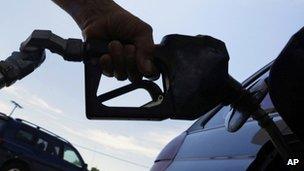US prices fall 0.1% in October as petrol costs drop
- Published

In October, petrol prices saw their biggest drop since April
US consumer prices fell 0.1% in October as petrol prices dropped, the US Labor Department has said.
Petrol prices fell 2.9%, the biggest drop since April. The cost of new cars, clothes and healthcare also fell.
The decrease meant that annual inflation in the 12 months to October was just 1%.
So-called core prices, excluding energy and food costs which vary more, were up 0.1% in October and increased 1.7% in the last 12 months.
On Tuesday, Federal Reserve chairman Ben Bernanke said the US central bank would maintain its liberal monetary policy for as long as needed and that could mean holding interest rates near zero until "well after" US unemployment falls to below 6.5%.
Analysts believe his comments make it more likely that the Fed will continue its $85bn (£53bn) bond-buying programme, aimed at stimulating the economy.
Critics of the programme fear it could lead to higher inflation in the future.
Busy festive season?
William Nicholls of Capital Spreads says the inflation figures will reassure the Federal Reserve that its policies are not having an adverse effect on prices.
He adds: "This is not only good news for consumers, this is also a welcome development for equity investors, as continuing fiscal stimulus will keep allowing the companies they are invested in to prosper - the market has rallied as a result."
Figures also released on Wednesday showed US retail sales up 0.4% in October, from flat in September, the US Commerce Department said.
In particular, sales of cars, clothes and furniture were behind the rise.
Economists say that lower petrol prices could mean households spend more during the crucial festive season.
In the US, consumer spending accounts for 70% of economic activity.
Also on Wednesday, the Federal Reserve was due to release minutes of a policymakers' meeting, but analysts say they do not expect to see many clues about whether the central bank is planning to reduce - or taper - its stimulus measures.
Wednesday's 1% rise in annual inflation was below the US central bank's target of keeping inflation under 2%.
Over the last four years, inflation in the US has been mild, with prices kept down by a slow recovery from the financial crisis.
Stubbornly high unemployment, which is currently at 7.3%, and only modest wage increases have led many retailers to put off raising prices.